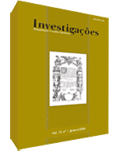Corpo Corpóreo: da interdição à transgressão
Abstract
Este ensaio analisa o monólogo Corpo corpóreo, de Luiz Marinho, tendo como leitmotiv o conceito de erotismo do escritor francês Georges Bataille. Nesta peça, deparamo-nos com um personagem-narrador, sem nome, que sofre de conflitos existenciais, em decorrência da perda de entes queridos, levando-o a se isolar do mundo e a repudiar o sexo; o que, segundo Bataille, caracterizaria uma forma de interdição. Enclausurando-se em sua casa, mas também em seu universo interior, o personagem reconta sua vida para uma sombra que lhe faz companhia. Volta-se para si mesmo, colocando-se em questão e, portanto, redimensionando sua experiência interior.References
ANDRADE, Carlos Drummond de. 2002. As contradições do corpo
In: —. Poesia completa. Introdução geral Silviano Santiago. Rio de
Janeiro: Nova Aguilar.
BATAILLE, Georges. 2004. O erotismo. Trad. Cláudia Fares. São
Paulo: Arx.
CHEVALIER, Jean; GHEERBRANT, Alain; e colaboração de André
Barbaut...[et al.]. 1990. Dicionário de Símbolos. 3° ed. Revista e
aumentada. Coordenação Carlos Sussekind. Trad. Vera da Costa e Silva,
Raul de Sá Barbosa, Angela Melim e Lúcia Melim. Rio de Janeiro: José
Olympio.
FOUCAULT, Michel. 2002. História da sexualidade, 3 — o cuidado
de si. 7º ed. Trad. Maria Thereza da Costa Albuquerque. Rio de Janeiro:
Graal.
FREUD, Sigmund. 1996. Luto e melancolia. In: — Obras psicológicas
completas de Sigmund Freud: edição Standard brasileira. Trad. e
orientação de Jayme Salomão. Rio de janeiro: Imago, p.243-263, v. XIV.
HOUAISS, Antonio. 2001. Dicionário Houaiss da Língua Portuguesa.
Rio de Janeiro: Objetiva.
MARINHO, Luiz. 1995. Corpo corpóreo. A estrada. Recife:
Comunicarte.
VIEIRA, Anco Márcio Tenório. 2004. Luiz Marinho: o sábado que não
entardece. Prefácio Antonio Cadengue. Recife: Prefeitura do Recife;
Secretaria de Cultura; Fundação de Cultura Cidade do Recife.
Downloads
Published
How to Cite
Issue
Section
License
Copyright (c) 2006 Igor de Almeida Silva

This work is licensed under a Creative Commons Attribution 4.0 International License.
Authors who publish with Revista Investigações agree to the following terms:
Authors retain copyright and grant the journal right of first publication with the work simultaneously licensed under the Creative Commons Attribution 4.0 International (CC BY 4.0) license that allows others to share the work with an acknowledgement of the work's authorship and initial publication in this journal.
Authors are able to enter into separate, additional contractual arrangements for the non-exclusive distribution of the journal's published version of the work (e.g., post it to an institutional repository or publish it in a book), with an acknowledgement of its initial publication in this journal.
You are free to:
Share — copy and redistribute the material in any medium or format for any purpose, even commercially.
Adapt — remix, transform, and build upon the material for any purpose, even commercially.
The licensor cannot revoke these freedoms as long as you follow the license terms.
Under the following terms:
Attribution — You must give appropriate credit , provide a link to the license, and indicate if changes were made . You may do so in any reasonable manner, but not in any way that suggests the licensor endorses you or your use.
No additional restrictions — You may not apply legal terms or technological measures that legally restrict others from doing anything the license permits.

